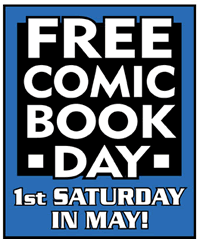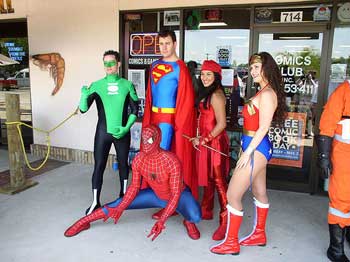 I walked into my local comic shop and saw few unfamiliar faces looking over a few freebies. I walked out with a thick stack of comic books, headed home, and consumed them in the best way: in one mad tear, one mad comic book binge.
I walked into my local comic shop and saw few unfamiliar faces looking over a few freebies. I walked out with a thick stack of comic books, headed home, and consumed them in the best way: in one mad tear, one mad comic book binge.
It was Free Comic Book Day, the comics industry’s to Halloween. But candy’s handed out in May. Comic publishers supply plentiful issues that are then handed out in comic shops around the world. It isn’t the pounds of sugar that will make your head spin, but the smell of fresh ink.
Four or five hours passed before I put down my last free comic book. A thought balloon hung over my head. What a complete waste of time. The seventh annual FCBD was a bad haul with the effort cut to accommodate the price. I must be insolent to complain about getting forty-one free comic books, but when a company gives you a sample, the idea is to make you a paying customer. But most publishers forewent storytelling and went straight for the sales pitch. These were comic brochures.
The majority of the Free 41 were either excerpts or pages of preview art. And the problem with the multiple previews could be seen in Viz’s Shonen Jump sampler. It had three stories — all close to incomprehensible.
(On the topic of the free manga offered, Jump was one of only three that fit the category. The others were a full-length graphic novel from Antarctic Press and a preview of the manga adaptation of James Patterson’s Maximum Ride novel series. Reading it left-to-right or the traditional manga way did not make the preview any less dumbfounding.)
Perhaps I could forgive the majority of comic book publishers had they offered new material instead of reprints. Gemstone Publishing brilliantly reprinted a 48-year-old story featuring Gyro Gearloose, successfully ensnaring today’s youth with colorful caption boxes: “How does Gyro happen to be in this awesome place? It is necessary to flash back to a recent day in Duckburg!”
DC Comics and Maerkle Press were the only publishers to offer a regular issue of a series for free. Unfortunately, issues were of the how-dumb-do-you-think-kids-are quality of Tiny Titans #1 and Love and Capes #7, the latter being a series flapping wildly in the world of superhero cliché.
DC’s other offering was a reprint of Grant Morrison and Frank Quitely’s All Star Superman #1 — an entertaining book, but one originally published three years ago and since reprinted numerous times. Dark Horse offered new Hellboy stories from Mike Mignola — one of the few FCBD comics worth the trip.
Marvel, during a major movie weekend, made some questionable choices. It published a brand new story by the strong creative team of Mike Carey and Greg Land. But it was an X-Men story, not Iron Man or even the Hulk. Those two characters, who appear in movies this summer, were relegated to a new Marvel Adventures book.
The Free 41 could have been worse. There was variety, from kids’ books to comic book journalism to books where the protagonist doesn’t wear a mask. Indie publishers provided the bulk of the books but only one publisher, Oni Press, offered a full-length story that was outside the superhero genre. Unsurprisingly, superheroes, rather than regular Joes, had the highest representation.
If I were to offer a sappy speech about FCBD, the first thing I would say is that the event is supposed to be about more than just the free comics. It’s supposed to be a celebration of the medium, its power to tell a story, its rich history. But how can I believe that when most books bothered only to make a pitch to buy the next one, the real one?
If FCBD was about seriously good comics, the titles offered would have been worth reading. But where was the free issue of DMZ? Of Fables? Of Thunderbolts? Of The Fantastic Four? Of Ex Machina? Of The Killer? Of Uncanny X-Men? Of 100 Bullets? Of anything happening now? Of the book that will transform someone into a Marvel Zombie? Of the book that will make someone an addict of any comic book genre?
 A free book along those lines wasn’t in my thick stack. And I doubt that many people who were in a comic shop for the first time will visit again and leave with an altogether different stack that contains a receipt. Reading an FCBD comic is like talking to the friend who tells you that he has an amazing story, but he doesn’t have the time to tell it to you right now. There were people in the stores, and FCBD deserves credit for this. But all these people ever got was a tease.
A free book along those lines wasn’t in my thick stack. And I doubt that many people who were in a comic shop for the first time will visit again and leave with an altogether different stack that contains a receipt. Reading an FCBD comic is like talking to the friend who tells you that he has an amazing story, but he doesn’t have the time to tell it to you right now. There were people in the stores, and FCBD deserves credit for this. But all these people ever got was a tease.
The smart shop owners built events into the day — artist signings, contests, etc. Some owners, however, can’t afford to do that. The villain of FCBD becomes the low quality comics that are not truly indicative of today’s comics — whether mainstream or indie. And if comic publishers want new readers, than they need to give the newbies the same comics that the old readers will pay for. The best sales pitch is a cliffhanger, not another six-page preview.